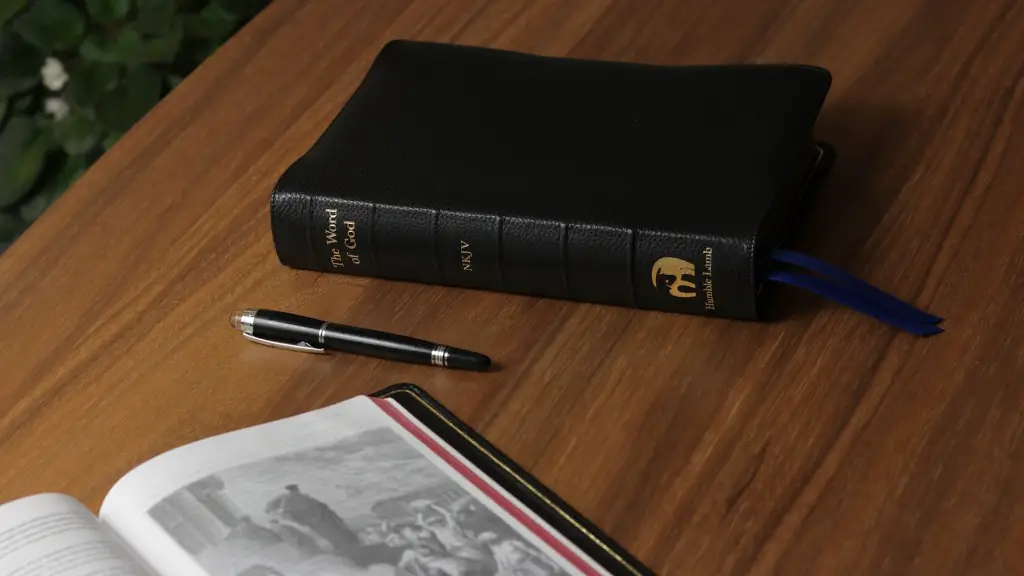The Bible is a collection of scriptures composed of 66 books written by a variety of authors, inspired by the Holy Spirit. One of the most popular books of all time, the Bible is both a historical and religious masterpiece that has been translated into hundreds of languages, read by millions of people, and studied in countless classrooms and churches. As the Bible is an ancient, religious book there are multiple interpretations of what the scriptures mean, however for over two thousand years, much of the Bible has been accepted as truth by many major world religions. Although there is much debate over who, and when, much of the Bible was written, most scholars agree that the earliest sections were composed between approximately 6th century BC, and 4th century AD.
The Bible often provides more than just a historical account of the lives of Biblical figures, it also paints a picture of their culture, customs and beliefs. A vast majority of the Bible takes place in the area known as the Levant and the Fertile Crescent. This area encompasses a large part of the Middle East, including present-day Syria, Lebanon, Jordan, Israel and Palestine. This region, known as the land of promise, is where the stories of Genesis and Exodus took place. The crucifixion and later resurrection occurs in Jerusalem, along with much of the apostles travels and teachings. Mecca, the site of Muhammads birth and the birthplace of the Qur’an and Islam, is also mentioned in the Bible’s Old Testament. In the New Testament, we read of Jesus’ mission and of the early church occurring in Jerusalem and the surrounding areas.
The Bible does not just take place in the Middle East though, the Greeks, Romans, and other cultures and countries are mentioned frequently. Paul’s missionary journeys, for example, took him to many places including Greece and Rome. Corinth was the backdrop of his missionary journey where he wrote an epistle to the church there. The letters to the seven churches of Asia, revealed in Revelations, gave us an insight of early Christianity in places such as Ephesus and Smyrna in what is today Turkey. The four Gospels, and other New Testament books, came to us from authors who wrote in locations around the Mediterranean. Also, due to widespread migration and tourism in antiquity, many stories in the bible are found in multiple Middle East regions, including Egypt and Persia.
Despite the Bible being seen as a religious and scholarly work, it is also a great work of literature and art. Its authors used a complex network of literary devices that allow us to truly appreciate the Biblical narrative. Historians and theologians have long studied the Bible to understand its literary structure, meaning, and the geographic information found between its pages. Through those studies, much has been revealed about the life and culture of those who lived in the region during the time when the Bible was written. Additionally, this has allowed us to gain an understanding of the relationship between people and land that is unique to the region in which the Bible takes place.
Societal Impact of the Bible
The Bible has had a tremendous impact on societies around the world and on the development of various religious traditions. Through its scriptures and stories, the Bible has served as a source of spiritual nourishment and faith for millions of people. Released in fragments over time, it offers invaluable insight into the human condition and has been used to question the status quo, challenge power and authority, and address themes of justice and redemption.
The Bible has also had a profound effect on politics and governmental institutions around the world. For centuries, the scriptures have been invoked and cited by political leaders – from the Roman Emperor Constantine to modern-day presidents – as a support for their rule and guidance for what is ‘right’ and ‘wrong’. This has helped shape the development of laws, moral codes and cultural values in various countries and has had a lasting impact on how we live our lives today.
The biblical landscape also provides insight into the power of storytelling and its ability to convey moral, spiritual and cultural truths. In the same way that Homer’s works offered valuable insight into ancient Greek culture, the Bible has become a primary source of religious, cultural and moral knowledge for millions of people across the globe. Touching on themes of love, forgiveness, grace and mercy, the scriptures are a powerful source of understanding for readers and a major influence on how people perceive the world.
Educational Resources on the Bible
As understanding of the Bible is essential for understanding many religious, societal and cultural issues, educational institutions around the world devote a great deal of resources to Biblical studies. There is now a wide range of books, multimedia materials, and other resources available that offer comprehensive explanations of the Bible’s history, text, and message.
In addition to traditional venues such as churches, schools and universities, more and more people are going online to access educational materials on the Bible. A range of free and subscription-based websites, blogs, podcasts and videos are available that provide commentary on the scriptures and offer an opportunity to engage in meaningful discussion. Bible study websites such as Logos Bible Software and The Bible Study Collection provide a large selection of resources and teaching materials that can be used to gain an in-depth understanding and appreciation of the Bible.
Progressive organisations such as Bibledex are also pioneering a new and engaging way to study the scriptures. Using interactive visuals, multimedia resources, and skillfully crafted stories, Bibledex offers an exciting journey through the Bible and a captivating experience to readers of all levels.
Current Challenges Facing the Bible
The unprecedented access to the Bible, enabled through digital media and the internet, has brought both opportunities and challenges for readers. With so many Bible versions, translations and interpretations available, it can be difficult for readers to discern which sources are reliable and beneficial for their studies.
In an increasingly globalised world, the Bible is also facing a range of cultural challenges. As religions spread and traditions change, the messages of the scriptures can become diluted and misinterpreted, resulting in fewer people seeking out the traditional sources of wisdom. Peoples’ religious beliefs and philosophies, previously shaped by the Bible, are now being shaped more by popular culture and various forms of media; leaving many to wonder what the Bible’s relevance is in modern times.
Preservation of the Bible
In light of these challenges, many organizations have emerged to address the preservation and promotion of the Bible. One such initiative is the Museum of the Bible, a museum located in Washington D.C. that seeks to bring the world of the Bible to life for visitors. The museum has a range of interactive exhibits that provide a visual experience and regional focus on the Bible’s impact. It also features an extensive audio tour and curated collections of artifacts and artwork that offer insight into the scriptures and their impact on the world today.
The preservation of the Bible takes place outside the museum too. Across the world, churches, libraries, and other venues are now preserving the Bible’s original manuscripts through digital technology and scientific study. Research teams are examining ancient texts and providing essential data on textual variants and discrepancies that can help scholars better understand the true message of the Bible.
The Bible is a source of immense power, wisdom, and understanding and its stories continue to captivate and inspire people today. By studying the scriptures and learning more about the world in which they were written, we can gain a greater appreciation and understanding of the Bible and its message. Through preservation and education, we can ensure that the Bible remains alive and relevant for years to come.



